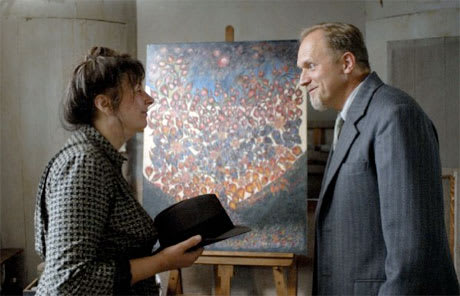The biopic of early 20th Century, naïve painter Seraphine Louis that won over French hearts, winning seven Cesars and a best actress award for Yolande Moreau, is an absolutely fantastic and beautiful film technically and in theory but makes little impact on the whole for a few key reasons. Beginning and ending with Seraphine nestled beneath a sturdy green tree on a grey landscape, the film seeks to connect the idiosyncratic artist with the earth that inspired her feral floral paintings. We understand that she feels connected to nature and that her passion for art is channelled directly from the Virgin Mary — a point the film makes by negating the fact that the actual artist did have some form of formal training — but we are never invited into her perspective. We understand that she is an outsider, which in turn connects her to fellow outsider/art collector Wilhelm Uhde (Ulrich Tukur), a closeted homosexual, and see her mostly through his eyes, which aren't always present within the context of the film. As an underdog, we champion her success, given that she is initially a socially inept, dirt-poor maid who demonstrates an unexpected talent that's initially handled derisively by her upper-class employers, despite her constant martyrdom and tendency to demonstrate irksome behaviour. Mostly, we notice the rich colour and complexity of her compositions in relation to a dreary landscape of earth tones, giving us an appreciation of her art, even if the artist herself is perhaps too off-kilter to even approach identification. This disconnect aside, Seraphine is an impressively crafted film, boasting complex performances with a dignified and apropos canvas for the isolated painter to seep onto. It's just a shame that it didn't pack the emotional punch that it intended. Included with the DVD is a "Making of" supplement in French only.
(E1)Seraphine
Martin Provost

BY Robert BellPublished Jun 9, 2009